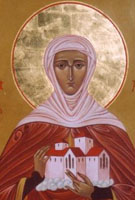Etheldreda quite possibly set some sort of record by marrying twice yet remaining a lifelong virgin. She was given as a child to a prince called Tonbert, but he died before she was fully grown. Later, she was in turn married to a child, Egfrid, heir to the throne of Northumbria. For a time she was able to pursue her religious vocation in peace, but soon Egfrid began to demand that she consummate their marriage.
With the help of her friend St Wilfrid, she fled, finally escaping the king's forces thanks to a miraculous week-long high tide. After many adventures, she made her way to the Isle of Ely, a piece of land in East Anglia that she had received as part of her dowry from Tonbert. There, in 673, she founded a large double monastery, and lived the rest of her days in absolute piety and austerity.
Throughout her life, Etheldreda wanted nothing more than to live in quiet contemplation of the Lord, and never gave in to the temptation to live as a queen or use her wealth for worldy ends.
The abbey that Etheldreda founded at Ely would go on to be constituted as a cathedral, and the town itself would flourish, becoming home to the largest medieval fair in Europe. Although the monks and nuns are long gone, the cathedral remains one of the most magnificent religious buildings in Britain. Many miracles are attributed to the saint herself.
As she grew older, Eltheldreda began to be afflicted by a large and unpleasant growth on her neck. She regarded this as divine punishment for the vanity she had displayed in her youth, when she had loved to adorn herself with necklaces. Despite, or possibly because of, the best treatment that medieval surgeons could offer, it eventually killed her on June 23, 679. Her body was disinterred seventeen years later, and found to be incorrupt.
One of the most popular of English saints, Eltheldreda was affectionately known as 'Audrey'. Despite her own holiness, her pet name gave us the English word 'tawdry', meaning shoddy, after the legendarily poor quality of goods sold at St Audrey's Fair in Ely.














